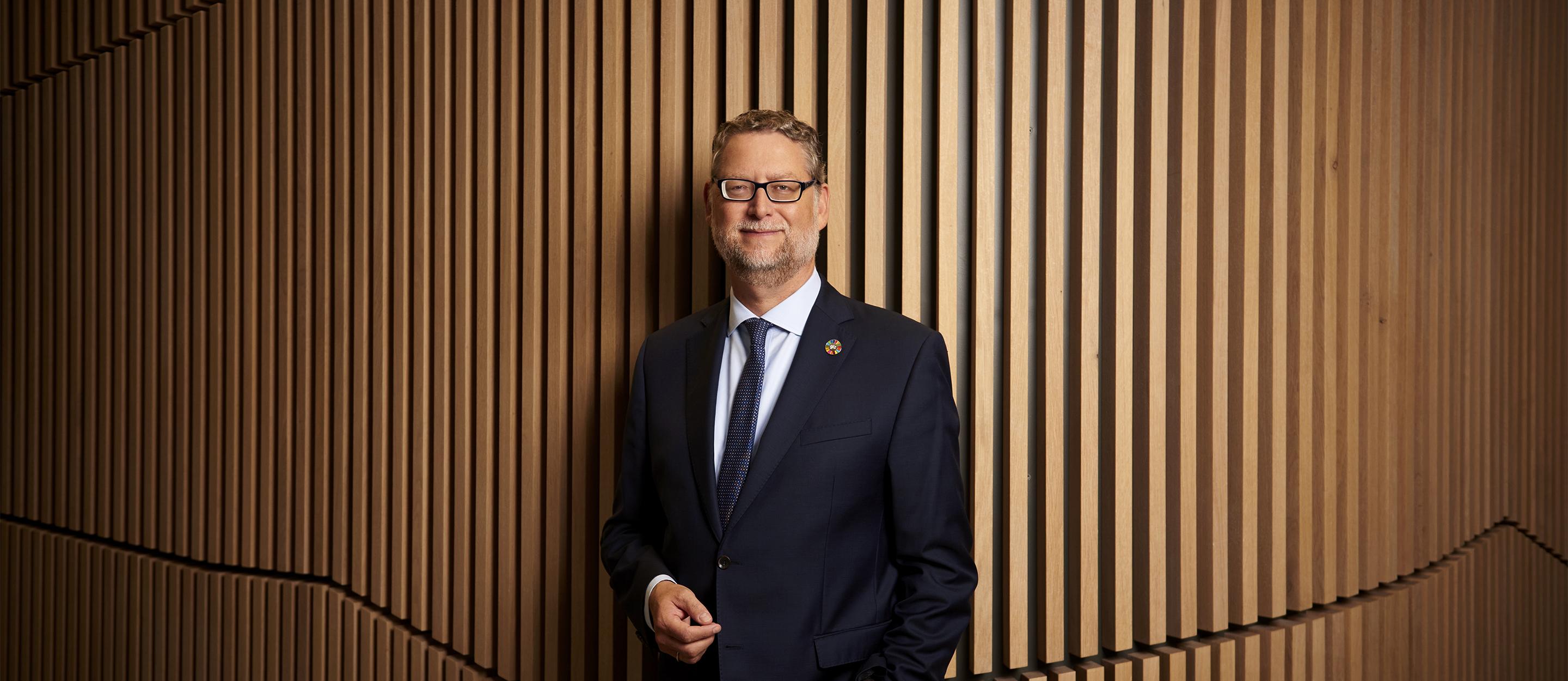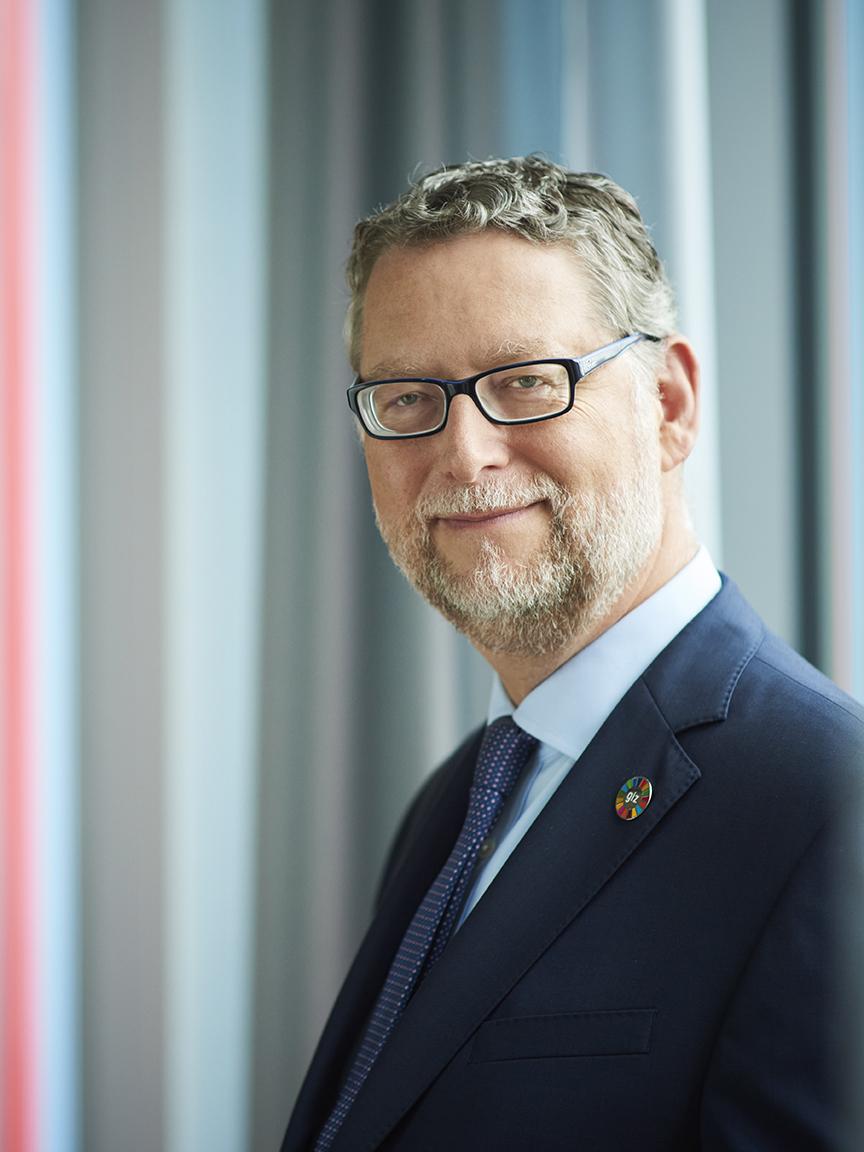 Gaby Gerster
Gaby Gerster
‘Our work is more important than ever’
Thorsten Schäfer-Gümbel, Chair of the Management Board of the Deutsche Gesellschaft für Internationale Zusammenarbeit (GIZ) GmbH, on Germany’s global responsibility and how international cooperation also achieves results in Germany
Development cooperation is facing criticism and, in some cases, even being called into question. Do you think that this is justified?
It is true that we are in the midst of an intensive discussion on the necessity and results of international cooperation. We have good arguments to bring to this discussion – international cooperation makes a substantial contribution in Germany’s interests because it addresses key issues for the future. It is an important building block and an expression of our global responsibility. We thus present ourselves globally as a responsible and effective partner.
What exactly does development cooperation do for Germany?
Firstly, we provide services in over 120 partner countries and improve the quality of life and livelihoods of people locally. But we should clearly recognise that this work has results that benefit Germany – we are fighting poverty and the root causes of displacement worldwide. By expanding renewable energies in developing regions, international cooperation contributes to mitigating climate change and also reduces dependence on fossil fuels, for example by promoting green hydrogen. This increases greater energy security in this country, too. It opens up opportunities for Germany’s economy because it opens doors to markets and for new technologies. It helps to attract urgently needed skilled workers. And these are just a few examples of our work.
So really, we need more development cooperation instead of less?
Given the myriad crises we are currently facing, we definitely need more international cooperation, as these crises do not stop at borders. The sustainability goals we have set ourselves as a global community, which together strive to remedy the current challenges, are far from being achieved. We need to step up the pace and we can only do that collectively. International cooperation is now more important than ever. Germany is an export nation and is more dependent than most countries on good international relations. Our prosperity is closely linked to this – in Germany, one in two euros is earned from exports.
And yet, development spending has still come under scrutiny …
That’s true. In the current budget, BMZ’s allocated funds have decreased, and we are also receiving fewer commissions as a result. This is regrettable for all the reasons I have already mentioned and, in my view, it is not expedient for Germany. As a company, we’re adapting to the new situation, although we’re not happy about it, of course.
Wouldn’t it be possible to cooperate more with the private sector to conserve scarce budget funds?
It’s part of our DNA at GIZ to cooperate closely with the private sector. We can’t achieve the goals of the 2030 Agenda without private funding, either. This is something we keep firmly in mind. The aim of our work is to create structures for self-sustaining development, a sustainable economy and investment. We are not a foreign trade agency, although we have overlapping interests, for example in attracting skilled workers, which is key to Germany’s future prosperity. We take great care to ensure that workers don’t leave their home country when they are needed there, but that a ‘triple win’ arises – where the home country, the host country and the migrants themselves all benefit. Generally speaking, a flourishing economy needs a peaceful environment, which in turn requires development. Development is pivotal for peace. GIZ makes a tangible contribution to improving people’s living conditions and thus also contributes to greater economic stability. Incidentally, every euro invested in sustainable development in our partner countries subsequently saves the taxpayer four euros for emergency humanitarian aid later. So a long-term, sustainable approach pays off.
GIZ implements a host of programmes and projects to improve people’s living conditions and tackle global challenges. Which ones really achieve results?
Development cooperation is probably one of the most thoroughly evaluated policy areas. We review our approaches and activities on an ongoing basis. Are we working efficiently and cost-effectively? Are we offering the right services? These are questions that we constantly ask ourselves. We make changes where we need to. This goes a long way to explaining why our results are good. Our latest evaluation report backs this up, with our projects rated 2.3 on average. They are effective, efficient and sustainable. GIZ achieves results.
What precise results is GIZ achieving?
In 2022 alone – we are still collecting the figures for 2023 – together with our clients and partners, we supported 370,000 young people in completing vocational training. Over 5.5 million people have gained better or first-time access to modern energy sources. Through our work, we have saved the equivalent of seven million tonnes of CO2 and supported more than 10.5 million people in coping with the impacts of climate change. These are just some of the highlights from a single year.
What about crisis countries like Mali?
GIZ is continuing its work in Mali following the military coup in 2021 and the withdrawal of the German armed forces, to prevent the situation in the Sahel region from deteriorating further. Our work there does not involve the government, which means that we work with non-governmental organisations and local authorities to continue projects that directly benefit the population. For example, we promote sustainable agriculture and wastewater disposal and support internally displaced people and the communities hosting them. GIZ has improved the living conditions of around half a million people with small-scale projects in the north of the country since 2016. This has a stabilising effect on the local municipalities. And it shows that, even under difficult conditions, we work effectively and achieve progress for people in the area. Working in crisis countries and conflict regions is an unfortunate reality for us. We would like things to be different, but the example of Mali shows that we are able to act and deliver, even under such conditions.
What does Mali have to do with Germany? Do we really need to worry about agriculture there?
Conditions that are more stable create prospects locally. We know that West Africa, in particular, is an important part of the route to Europe. The more that people have a livelihood for themselves and their families, the less likely they are to embark on journeys to Europe that can be dangerous. It is also in Germany’s interests that the Sahel region is stable.
You also work closer to home – such as in Ukraine. Why is working there so important to GIZ?
In Ukraine, we are also working under challenging conditions. But this support is in our direct interest, particularly with regard to security. Germany is the second-largest bilateral donor in Ukraine after the USA. For example, we support the economy, which must continue to work even in times of war in order to provide people with incomes and prospects. But we also support municipalities in maintaining hospitals, schools and community centres. Since the start of the war, 1,500 small businesses have received grants. We are currently involved in various projects and programmes in Ukraine worth around EUR 660 million. In addition to providing people with the swift assistance required, our work is now already focusing on rebuilding the country and aligning it with the EU. Our work in Ukraine is an important element in ensuring peace in Europe.
These are all examples of how committed our staff are to their work. We are the experts for action. And we make sure that development cooperation is implemented even in the most difficult circumstances. Our GIZ teams around the world ensure that we deliver these services and work efficiently and in a targeted manner. I would like to take this opportunity to thank them sincerely for their efforts.
 Gaby Gerster
Gaby Gerster
Thorsten Schäfer-Gümbel